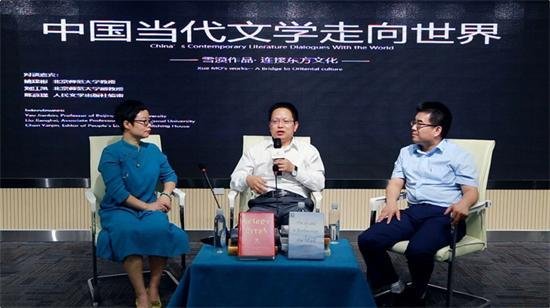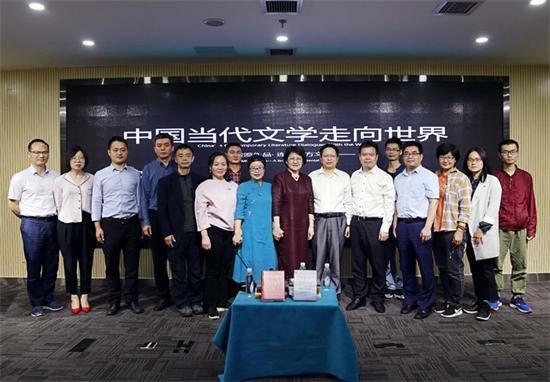
Contemporary Chinese Literature Going to the World
Xue Mo's Works
-- Connecting Oriental Culture
At 14:30 on September 29, 2020, Yao
Jianbin, Professor of School of Chinese Language and literature of Beijing
Normal University, Liu Jiangkai, Associate Professor of Academy for
International Communication of Chinese Culture of Beijing Normal University,
and Chen Yanjin, Editor of People's literature Publishing House, have visited
the National Base for International Cultural Trade for a dialogue forum
entitled "Contemporary Chinese Literature Going to the World", where
they exchanged views on the translation, dissemination, promotion, overseas
influence and future prospects of contemporary Chinese literature and took Xue
Mo, the national first-class writer, and the overseas translation and
publication of his works as examples for an in-depth interpretation.
Chen Gang, Deputy General Manager of
Beijing Cultural Investment Development Group Co., Ltd., mentioned in his
opening speech at the forum, as a national cultural trade service platform
constructed by Ministry of Culture and Tourism of the People’s Republic of China
and the People's Government of Beijing Municipality, the National Base for
International Cultural Trade (Beijing) has always been committed to serving as
"the window for Chinese culture to go global and promoting the convergence
for the world culture in China". The participation in Frankfurt Book Fair
of writer Xue Mo, and the research and voice on the worldwide platform of all
present teachers, are not only conducive to the understanding over the world of
Chinese literature and culture, but also of great significance for the
establishment of a good national image and the deepening of the future
international cooperation. Our platform is willing to work with all of you with
one heart and one mind to make joint efforts for Chinese literature and culture
to go global.
Liu Lixia, Deputy Secretary General of
the Publishers Association of China, mentioned in her opening speech at the
forum, the purpose to hold this activity is to introduce Chinese literature to
the world, convey the good voice of Chinese literature, and share the
interpretation and research results for Chinese writers represented by writer
Xue Mo and their works, which will help the world to have a thorough knowledge
of China and its excellent traditional culture.
During the forum dialogue, Professor Yao
Jianbin, who has always been devoted to the study of overseas dissemination of
contemporary Chinese literature , believed that the overseas dissemination of
classical Chinese literature, along with that of modern Chinese literature and
of contemporary Chinese literature, as three sections that complement and
achieve each other, has constituted overseas dissemination of Chinese
literature. In different regions and countries, the acceptance and recognition
of Chinese literature at different stages differ greatly. Generally speaking,
as far as the existing overseas dissemination of Chinese literature is
concerned, it is increasingly obvious that the overseas dissemination of
contemporary Chinese literature gains momentum, while the overseas
dissemination of Chinese classical literature has been going on steadily and
continuously.
At present, the English-speaking world
has still served as a significant reaction and test field for the overseas dissemination
effect of Chinese literature. Due to various reasons, the dissemination effect
of Chinese literature in other languages will show differences with rich
connotation.

Professor Liu Jiangkai believed that, in
the literary genre, novels and poems can still gain popularity from the
perspective of overseas dissemination and acceptance. Since the 20th century,
among the Chinese writers whose works have mainly been translated overseas into
English, the contemporary writers have outnumbered the modern writers, and the
quality of their works has also been higher than that of the latter, all of
which can prove that since the 40th anniversary of China's reform and opening
up, China has not only made great development in economy, but also achieved
world-renowned results in literature and art.
How can we spread these good works
overseas and make them acceptable to readers to the greatest extent? In the
view of Associate Professor Liu Jiangkai, to disseminate contemporary Chinese
literature overseas, the principle of "cross-field integration and
collaborative innovation", as a systematic operation for a long time,
should be adhered to. He first emphasized the quality of the writer's creation,
for which can be taken as the starting point and foundation of all high-quality
overseas dissemination. And the second most important is the translation of
works, then the publishing and distribution, as well as the coordination and
development between other related processes. He also stressed that from the
national cultural sector to scientific research institutions in universities and
social non-governmental organizations, from writers to translators and
agencies, the overseas dissemination of a book or even of the contemporary
Chinese literature as a whole, is always an interdisciplinary, cross-language
and cross-cultural collaborative project. Therefore, writers should be patient
and the primary thing for them is to create good works. As mentioned in the Xue
Mo's works, as a writer, one does not need to ingratiate himself with the
readers deliberately, for bad products will be eliminated and good works will
be survived through the test of time. We are supposed to have faith in the
power of readers.
Chen Yanjin said that as a powerful
writer in the Chinese literary circle, Xue Mo has been shortlisted for the Mao
Dun literature Award for three times, with eight full-length novels, including
Desert Rites, Curses of Western Xia, The Wildfox Ridge and The Legend of Heroes
From Liangzhou. At present, an epic masterpiece Suosalang with 100,000 lines
and millions of words written by him is about to be published. Based on the
rural areas of western China, the works of Xue Mo have shown the history and
present of the west and the western culture, created the images of such western
local figures as farmers, hunters, camel herders, and folk soldiers, and
further depicted their survival, soul, love and belief. With the effect of
inquiring about human nature and seeking eternity, his works have been full of
majestic and vivid artistic appeal and possessed the power to wash and
sublimate the inner soul. Praised by several domestic media as " western
novels in the true sense" and "invaluable works of art", some of
the works have been published by some foreign publishing and distribution organizations.
The British Newspaper the Guardian once
published the full text of Old Man Xinjiang in English and considered it one of
the five best short stories in contemporary China.

A column of Xue Mo's novels has been
opened in the 15th issue of the "Chinese literature and Culture", an
American English Magazine, with the comment that embracing the unique writing
style full of great spirituality and imagination, the author Xue Mo has not
only perfectly integrated life, reality, history and faith, but also endowed
unique spiritual strength and charm thoroughly in various time-space interwoven
narratives.
The rich and profound local Chinese
background, the vivid and mysterious western Chinese culture, and the strong
faith and affection in Xue Mo's works, as well as the unique thinking and
exploration of such human issues as existence, human nature, soul, life and
eternity, have aroused the extensive attention of top translators and
sinologists from all over the world, and Xue Mo has successfully established cooperation
relations on translation with them, such as Howard Goldblatt of the United
States, Nicky Harman of Britain, Carducci Lisa of Canada, Hans-Peter Kolb of
Germany, Constantin Lupeanu of Romania, Liljana Arsovska of Mexico, Dinesh
Kulatunga of Sri Lanka, etc. So far, Xue Mo's works have been translated into
more than 20 foreign languages, involving English, German, French, Russian,
Korean, Japanese, Italian, Nepali, Spanish, Arabic, and so on. And as many as
35 translation versions of his works have been published by Bacopa Verlag
Publishing Company, Wanzhi House of Sweden, Red Eagle Publishing House of
Turkey, ArabLiterature Center (ADAB), Neptune Publications and Nepal Book Hill
Co., Ltd., and at the same time, more and more translations will be available
to readers from all over the world after being published by numerous
influential publishing houses in succession.
In recent years, Xue Mo has been
committed to cultural and educational exchanges and cooperation between China
and foreign countries. He ever attended the Sino-French Cultural Forum with a
speech entitled literature and Spirituality at the French Institute (L'Institut
de France), and visited successively more than 20 countries and regions,
including North America, Europe and South Asia. In 2019, Xue Mo held a dialogue
with Wolfgang Kubin, a renowned sinologist from Germany, at Frankfurt Book
Fair. The "Bookshelf for Xue Mo's Works" has also entered the United
States, Canada, Italy, Hungary, Nepal and other countries in succession,
promoting the expansion of popularity of Xue Mo overseas.
All highly recognizing the achievements
of Chinese literature and the characteristics of Chinese culture embodied in
the Xue Mo's works, these three experts believed that the overseas
dissemination of a new batch of contemporary
Chinese literature represented by Xue Mo's works will enter a new stage.
The video of this dialogue will be launched for a cloud exhibition at the
Beijing International Book Fair (BIBF), which is currently being held, and will
be released on the online Frankfurt Book Fair in Germany in October.